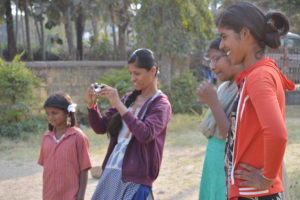I’m a feminist. I’ve been a female for a long time now. It’d be stupid not to be on my own side.
– Maya Angelou
One of the aims of the Dhwanigalu programme was to enable the participants to critically examine the gender roles. Activities and sessions aimed at visibilising the quantum of unpaid labour done by women as well as visualising the possibilities of gender role reversal were designed to achieve this aim. These activities significantly bolstered the standing of their gender in the eyes of the participants. Also, activities such as a ‘power game’ opened their eyes to the structural nature of gender based oppression. This understanding of the structural marginalisation and its impacts, along with a rise in the valuation of the self, have enabled the girls to better negotiate gender roles in public and private spheres.
However, imparting a feminist pedagogy to adolescent girls while situated in a deeply conservative society can result in patriarchal backlash if the parents and general community are not sensitised simultaneously. Prakriye has always worked to address this by marshalling support from the community by reaching out to the parents as well as the larger general community through community screenings, exhibitions and regular interactions. Students are also encouraged to share the videos, audio resources and the snippets of discussion with their families, thus making incremental changes in their attitudes.
The strategy of sharing resources with families and initiating discussions with them, turned out to be particularly effective. According to one of the participants, after sharing the resources and her reflections from the training on a regular basis, her brother has started helping out with household chores such as fetching water. The girls also reported that at homes, their male relatives have started sharing the domestic labour albeit at a small level.
The training has also positively influenced the life aspirations of the girls. The realisation that their aspirations need not be set by the social norms but can be freely imagined has enabled at least some of them to visualise and voice new career aspirations. For example, during the discussion in Kattemanuganahalli, the girls observed that there are no female lawyers or drivers in their village. They also shared their plans to enter these professions by acquiring necessary skills. Also, in the villages, while it is usual for men to migrate to cities in search of employment, women are discouraged from doing so. The girls in the group mentioned this as well and said that they are determined to be gainfully employed even if it meant commuting outside the village.
The training has also helped in improving the mobility and social standing of the Kishoris. In this regard, creation of digital stories have turned out to be quite effective as they have opened the doors to hitherto unventured areas of the locality. They were able to go to public spaces that were typically considered as the exclusive domain of upper caste males, such as the Peepul tree in the village centre. One of the girls was so enthralled by the mobility that photography offered that she expressed a desire to take up photography as a profession in the future.

During their interaction with teachers and parents, facilitators got the feedback that the training has improved the analytical and decision-making skills of the girls. Some parents gave the feedback that behaviour of the girls has become more mature. Due to these positive impressions, the Prakriye team, has been able to earn the trust of the parents and developed good rapport with them. For example, the team was able to successfully discourage the mother of a 17-year-old girl from fixing her marriage to an older relative. She also agreed to their request to let her daughter continue the studies.
The trainings also provided a safe pace for those girls who were marginalised due to physical disabilities. For example, S, a girl with a speech disorder was largely neglected by her family and the community. Initially, her parents were reluctant to let their daughters join the program. When Prakriye team persisted, they allowed S to join the programme but forbade her younger sister from joining, as their expectations from the program were low at that point. S’ parents were sceptical as to what she could contribute to the program as well.
At Prakriye, team listened to S and encouraged her to talk. As a result, she felt recognised and her confidence level increased. Subsequently, S, who used to choose seats in the last row, now prefers to sit in the very front row and actively participates in all the activities and games. She has also started speaking up more. Convinced by the positive strides that S made, her parents agreed to send her younger sister to the training as well. The Prakriye team also spoke with her parents regarding the importance of actively listening to her and encouraging her to talk. Similarly, P, who has a physical disability, is an eager participant in the sessions.
While the strides that Prakriye made have been small and gradual, they have been influential in enabling the participants to make empowered choices in their education and career. For example, In geographies where higher education of the adolescent girls is not deemed a priority, all but four participants of the Dhwanigalu phase one programme, proceeded to enrol for further studies.
Prakriye also hopes that the participants of the Dhwanigalu, in addition to be able to take charge of their lives, will also be able to take feminist politics forward in the region especially in the context of continuing neglect of the critical education for women empowerment in the neo liberal regime.